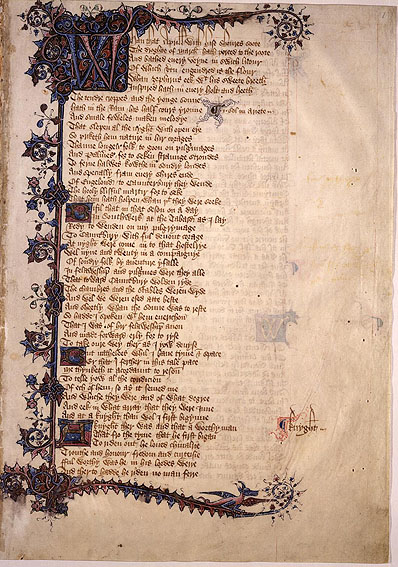Well, I am going to provide the short-course biography of Chaucer (1343?-1400 CE). He was an English diplomat, translator and poet who held several important minor positions in the administration of the kingdom and later in the household of King Edward III. Chaucer was the author of The Canterbury Tales and many other works and poems, and he has come to be known as the father of English literature. There are some great links listed below if you want to read more about Chaucer.
In the Canterbury Tales (aka CT), Chaucer described a rather typical medieval pilgrimage to the shrine of Saint Thomas Becket at Canterbury Cathedral. The tales are set up as a frame story, similar to Giovanni Boccaccio's Decameron or the Thousand and One Nights, in which an outer narrative structure provides a framework for all the short tales.
Somewhere along the way through the course of the centuries, the CT entered the literature curriculum and so allowed millions of students in the English-speaking world to learn about the exploits of the wife of Bath--I'm sure that many foreign students have also not been deprived of the pleasures of learning about the wife of Bath in translation. Many of you may have already encountered Chaucer in your high school English classes. Now you have another chance.

This is the Prologue (the start of the Canterbury Tales) from the Ellesmore Chaucer illuminated manuscript dating to the fifteenth century. Online source
Some things to keep in mind as you read a few excerpts from the CT. First, while they are literature, we can also read the tales as historians to see what the tales reveal about the mind-set of medieval English society. Second, please remember that these tales are fiction. For example, the Knight's Tale did not actually happen. While Chaucer might have wanted to criticize aspects of English knighthood, he felt that he could not do it directly. Instead he could do that by setting a story about knights in the distant past, a thousand years ago. Third, similar to my point two, the tales in which Chaucer recalls the intervention of the gods does not mean that Chaucer was not a Christian. Again, this was a way for Chaucer to reference the continuing strong role that superstition played in the religion of the common people in England in the Middle Ages.
So, to conclude, why are we reading (and enjoying) the CT.? Let me say again, that we can use these tales to help to understand how people in Medieval England felt about each other, the king, the church, the nobility, their pets, their food, their work, etc.

Some recommended online lectures and websites:
- The very long wikipedia entry on Chaucer is very good. Check out the Catholic Encyclopedia entry on Chaucer also.
- The main online resource site with Chaucer materials is eChaucer: Chaucer in the Twenty-First Century.
- The Luminarium Chaucer page has a good biography, essays and also Chaucer's works.
- Some of Chaucer's works are available at Project Gutenberg.
- Sam Leith, A window on Chaucer’s cramped, scary, smelly world
- The original olde Middle English version of the Canterbury Tales is available online accompanied by a glossary and translations of the difficult words.
- Guess what? A lot of classes at Harvard University study Chaucer, and so Harvard created its own detailed, and very useful, Chaucer study page. PS. A lot of faculty at other schools have pages devoted to Chaucer. See this list.
- Professor Lee Patterson, Yale University, has an online lecture on Chaucer.
- In our Time: Chaucer (a BBC radio broadcast that you can listen to that discusses Chaucer)
- On YouTube you can watch (and listen to) The Canterbury Tales Prologue in the original Middle English language.
- A good, short index of Chaucer materials online is available at sonic.net/~rteeter/chaucer.html.
- Ellesmore Chaucer is an illuminated manuscript dating to the early fifteenth century.
- For extra credit please suggest to your instructor a
relevant website for this unit of the course. Send the title of the site, the URL and a
brief explanation why you find the information interesting and applicable to
the material being studied in this unit.